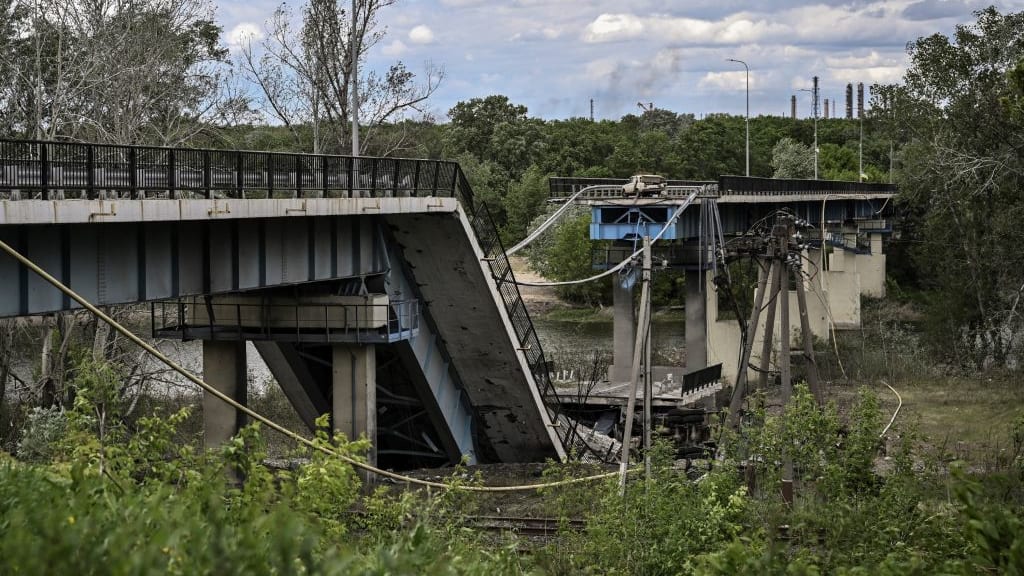Russia destroys the last bridge to Sievierdonetsk, cutting off Ukrainian defenders and Russian advance


A free daily email with the biggest news stories of the day – and the best features from TheWeek.com
You are now subscribed
Your newsletter sign-up was successful
Russian forces and artillery have pushed Ukrainian defenders out of the center of Sievierodonetsk, one of Ukraine's last strongholds in eastern Luhansk province, and damaged the third and final bridge connecting Sievierodonetsk to its twin city Lysychansk and supply lines to the west, Ukrainian officials said late Monday. "It is currently impossible to use the bridges," said Luhansk regional governor Serhiy Haidai.
Russia destroyed the second of the three bridges over the weekend, and with all three now unusable it will be "difficult, but not impossible," to resupply Ukraine's embattled defenders with food, weapons, ammunition, and reserve troops, Haidai said.
"The ways to connect with the city are quite difficult, but they exist," Oleksandr Struik, head of Sievierodonetsk military administration, said on Ukrainian television. About 500 civilians are holed up with Ukrainian defenders at the city's Azot chemical plant, he said, and evacuations are taking place "every minute when there is quiet there, or there is a possibility of transportation."
The Week
Escape your echo chamber. Get the facts behind the news, plus analysis from multiple perspectives.

Sign up for The Week's Free Newsletters
From our morning news briefing to a weekly Good News Newsletter, get the best of The Week delivered directly to your inbox.
From our morning news briefing to a weekly Good News Newsletter, get the best of The Week delivered directly to your inbox.
Severing all three bridges between Sievierdonetsk and Ukrainian-held territory will trap the remaining Ukrainian soldiers, but Russia pays a cost, too. "Russian forces should, in principle, be seeking to seize the bridges rather than destroy them, since Russian troops have struggled to cross the Siverskyi Donetsk River," U.S. think tank the Institute for the Study of War noted Sunday. "It seems unlikely that the benefit of catching a relatively small number of defenders would be worth the cost of imposing a contested river crossing on Russian troops."
The battle for Ukraine's eastern Donbas region, which includes Luhansk, "will surely go down in military history as one of the most brutal battles in Europe and for Europe," Ukrainian President Volodymyr Zelensky said in his nighty address Monday. "And we draw the attention of our partners on a daily basis to the fact that only a sufficient number of modern artillery for Ukraine will ensure our advantage and finally the end of Russian torture of the Ukrainian Donbas."
Ukraine "requires support from the U.S. and NATO," retired U.S. Gen. Mark Hertling tweeted Monday, But its request for 1,000 howitzers, 300 multiple-launch rocket systems, and other artillery isn't feasible for the U.S. or Ukraine. "The courage and tenacity Ukraine has shown is exemplary and they are fighting for all of us," he added. With appropriate support, "Ukraine will win, but it will be a tough fight."
A free daily email with the biggest news stories of the day – and the best features from TheWeek.com
Peter has worked as a news and culture writer and editor at The Week since the site's launch in 2008. He covers politics, world affairs, religion and cultural currents. His journalism career began as a copy editor at a financial newswire and has included editorial positions at The New York Times Magazine, Facts on File, and Oregon State University.
-
 The ‘ravenous’ demand for Cornish minerals
The ‘ravenous’ demand for Cornish mineralsUnder the Radar Growing need for critical minerals to power tech has intensified ‘appetite’ for lithium, which could be a ‘huge boon’ for local economy
-
 Why are election experts taking Trump’s midterm threats seriously?
Why are election experts taking Trump’s midterm threats seriously?IN THE SPOTLIGHT As the president muses about polling place deployments and a centralized electoral system aimed at one-party control, lawmakers are taking this administration at its word
-
 ‘Restaurateurs have become millionaires’
‘Restaurateurs have become millionaires’Instant Opinion Opinion, comment and editorials of the day
-
 The mission to demine Ukraine
The mission to demine UkraineThe Explainer An estimated quarter of the nation – an area the size of England – is contaminated with landmines and unexploded shells from the war
-
 The secret lives of Russian saboteurs
The secret lives of Russian saboteursUnder The Radar Moscow is recruiting criminal agents to sow chaos and fear among its enemies
-
 Is the 'coalition of the willing' going to work?
Is the 'coalition of the willing' going to work?Today's Big Question PM's proposal for UK/French-led peacekeeping force in Ukraine provokes 'hostility' in Moscow and 'derision' in Washington
-
 Ukraine: where do Trump's loyalties really lie?
Ukraine: where do Trump's loyalties really lie?Today's Big Question 'Extraordinary pivot' by US president – driven by personal, ideological and strategic factors – has 'upended decades of hawkish foreign policy toward Russia'
-
 What will Trump-Putin Ukraine peace deal look like?
What will Trump-Putin Ukraine peace deal look like?Today's Big Question US president 'blindsides' European and UK leaders, indicating Ukraine must concede seized territory and forget about Nato membership
-
 Ukraine's disappearing army
Ukraine's disappearing armyUnder the Radar Every day unwilling conscripts and disillusioned veterans are fleeing the front
-
 Cuba's mercenaries fighting against Ukraine
Cuba's mercenaries fighting against UkraineThe Explainer Young men lured by high salaries and Russian citizenship to enlist for a year are now trapped on front lines of war indefinitely
-
 Ukraine-Russia: are both sides readying for nuclear war?
Ukraine-Russia: are both sides readying for nuclear war?Today's Big Question Putin changes doctrine to lower threshold for atomic weapons after Ukraine strikes with Western missiles
